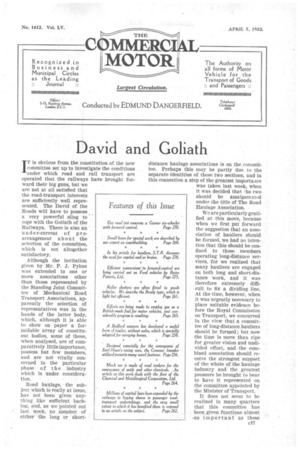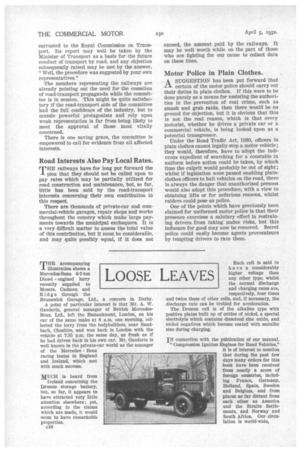David and Goliath
Page 39

Page 40

If you've noticed an error in this article please click here to report it so we can fix it.
IT is obvious from the constitution of the new committee set up to investigate the conditions under which road and rail transport are operated that the railways have brought forward their big guns, but we are not at all satisfied that the road-transport interests are sufficiently well represented. The David of the Roads will have to possess 4 a very powerful sling to cope with the Goliath of the Railways. There is also an under-current of pr earrangement about the selection of the committee, which is not altogether satisfactory.
Although the invitation given by Mr. P. J. Pybus was extended to one or more associations other than those represented by the Standing Joint Committee of Mechanical Road Transport Associations, apparently the selection of representatives was in the hands of the latter body, which, although it is able to show on paper a formidable array of constituent bodies, some of• these, when analysed, are of comparatively little importance, possess but few members, and are not vitally concerned in the particular phase of the industry which is under consideration.
Road haulage, the subject which is really at issue, has not been given anything like sufficient backing, and, as we pointed out last week, no member of either the long or short distance haulage associations is on the committee. Perhaps this may be partly due to the separate identities of these two sections, and in this connection a step of the greatest importaace was taken last week, when it was decided that he two should be ama 'gam a t+ under the title of The Road Haulage Association.
We are particularly gratified at this move, because when we first put forward the suggestion that an association of hauliers should be formed, we had no intention that this should be confined to those members operating long-distance services, -for we realized that many hauliers are engaged on both long and short-distance work, and it was therefore extremely difficult to fix a dividing line. At the time, however, when it was urgently necessary to place suitable evidence before the Royal Commission on Transport, we concurred in the view that-a committee of long-distance hauliers should be formed; but now the time is more than ripe for greater vision and undivided effort, and the combined association should receive the strongest support of the whole of the haulage Industry and the greatest pr-essure be brought to bear to have it represented on the committee appointed by the Minister of Transport.
It does not seem to be realized In many quarters that this committee has been given functions almost --as import an t as those entrusted to the Royal Commission on Transport. Its report may well be taken by the Minister of Transport as a basis for the future conduct of transport by road, and any objection subsequently raised may be met by the answer, "Well, the procedure was suggested by your own representatives."
The members representing the railways are already pointing out the need for the cessation of road-transport propaganda while the committee is In session. This might be quite satisfactory if the road-transport side of the committee had the full confidence of the industry, but to muzzle powerful protagonists and rely upon weak representation is far from being likely to meet the approval of those most vitally concerned.
There is one saving grace, the committee is empowered to call for evidence from all affected interests.
Road Interests Also Pay Local Rates.
THE railways have for long put forward the plea that they should not be called upon to pay rates which may be partially utilized for road construction and maintenance, but, so far, little has been said by the road-transport interests concerning their own contribution in this respect.
There are thousands of private-car and commercial-vehicle garages, repair shops and works throughout the country which make large payments towards the municipal exchequers. It is a very difficult matter to assess the total value of this contribution, but it must be considerable, and may quite possibly equal, if it does not exceed, the amount paid by the railways. It may be well worth while on the part of those who are fighting for our cause to collect data on these lines.
Motor Police in Plain Clothes.
•A SUGGESTION has been put forward that certain of the motor police should carry out their duties in plain clothes. If this were to be done purely as a means for assisting the authorities in the prevention of real crime, such as smash and grab raids, then there would be no ground for objection, but it is obvious that this Is not the real reason, which is that every motorist, whether he drives a private car or a commercial vehicle, is being looked upon as a potential transgressor.
Under the Road Traffic Act, 1930, officers in plain clothes cannot legally stop a motor vehicle ; they would, therefore, have to adopt the ludicrous expedient of searching for a constable in uniform before action could be taken, by which time the culprit would probably be out of sight ; whilst if legislation were passed enabling plainclothes officers to halt vehicles on the road, there is always the danger that unauthorized persons would also adopt this procedure, with a view to obtaining lifts or for nefarious reasons, whilst raiders could pose as police.
One of the points which have previously been claimed for uniformed motor police is that their presence exercises a salutary effect in restraining drivers from taking undue risks, but this Influence for good may now be removed. Secret police could easily become agents provocateurs by tempting drivers to race them.












































































































